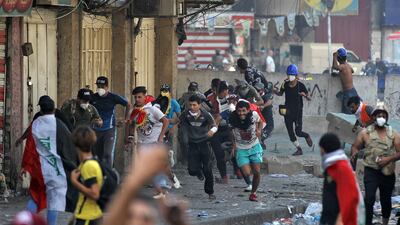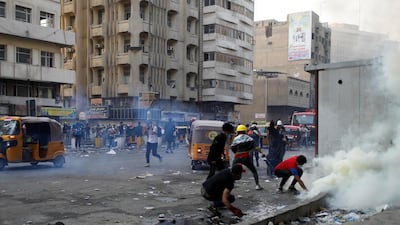Iraqi Prime Minister Mustafa Al Kadhimi said on Tuesday that his government is pressing ahead with a multi-billion dollar strategic agreement with China, rejecting claims that he had sought to derail the deal.
Opponents had accused him of favouring the US — China's geopolitical rival ― and seeking to obstruct Iraq's participation in Beijing's Belt and Road Initiative.
Mr Al Kadhimi, former head of the Iraqi National Intelligence Service, became prime minister in May 2020, after pro-reform protests forced his predecessor Adil Abdul Madhi to resign.
When demonstrations over issues including corruption, unemployment and public services erupted in October 2019, Iraq was in the process of finalising the deal with Beijing.
Baghdad had started implementing some aspects of the agreement, including the construction of power stations and municipal buildings, as the country sought to rebuild after decades of war.
But this was halted by the protests, the pandemic and the drop in oil prices.
Since then, Iran-aligned political factions have accused Mr Al Kadhimi of leaning too much towards the US and its allies, at China's expense.
Their campaign intensified after the government in December 2020 picked South Korea’s Daewoo Engineering and Construction company to build the Grand Port of Al Faw in the south of country, having already signed several contracts with the company to work on related infrastructure.
“Over the past two years, many accusations have been levelled against this government at a time when we all, the prime minister and ministers, have shouldered big responsibilities,” Mr Al Kadhimi said at the weekly Cabinet meeting.
“Among these accusations is one that accuses this government of obstructing the implementation of the deal with China,” he said.
Last week, Mr Al Kadhimi laid the cornerstone for a project that will involve Chinese companies building 1,000 schools across Iraq.
“This is the first stage within the deal with China, there are more schools to come and we will continue implementing some projects within that deal,” he added.
“The allegation that the government has hampered the Chinese deal due to external pressure has been proven false by this reality,” he said.
The war against ISIS, from mid-2014 to late 2017, has left large parts of northern and western Iraq in ruins.
Lack of funds, widespread corruption and political wrangling have delayed postwar reconstruction.
Reconstruction of the most devastated urban areas — intended to help displaced people return — has been extremely slow.
International donors have helped repair power stations, schools and water treatment facilities for communities that suffered less severe damage.
In early 2018, Iraq appealed for around $88.2 billion at an international donors summit in Kuwait, at which countries pledged around $30bn in loans and investment. But grants made up the minority of the amount pledged and Iraq struggled to raise revenue during the oil price downturn.
To overcome obstacles on the way to reconstruction, Iraq reached in September 2019 a deal with China to help secure much-needed funds, mainly for infrastructure projects by Chinese companies.
The deal, known as Oil for Reconstruction, is part of China’s Belt and Road Initiative ― a global development strategy adopted by Beijing in 2013 involving infrastructure development and investments in nearly 70 countries in Asia, Africa and Europe.
China was interested in building the Grand Port of Al Faw, near Basra, creating a shorter transportation corridor between the Middle East and Europe, bypassing the Suez Canal through the expansion of a national rail network.
The countries agreed on establishing a fund in which Iraq would deposit the revenue for 100,000 barrels of oil sold every day to two Chinese companies, while the rest would come from loans from Chinese banks with a limit of $10 billion.
That year, Iraq started depositing its share and a government committee was commissioned to identify projects.
But that deal, which was supposed to run for 20 years, was shelved after the delay in approving the 2020 budget. Iraq withdrew funds to meet other needs.
















